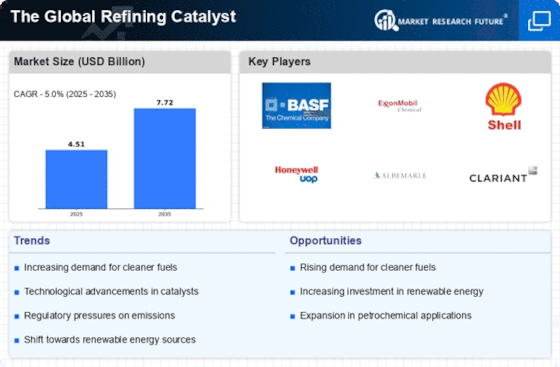Top Industry Leaders in the Refining Catalysts Market

In the fiery depths of oil refineries, where crude oil transforms into the fuels and petrochemicals that power our world, refining catalysts play a crucial role. These specialized materials act as microscopic cheerleaders, accelerating and guiding the complex chemical reactions that break down, rearrange, and upgrade crude oil into usable products. The global refining catalyst market, is a crucible of competition where titans of the chemical industry clash for dominance. Let's delve into this dynamic landscape, exploring the key players, their winning strategies, and the factors shaping their success.
Key Players and Winning Strategies:
- Global Giants: Companies like BASF, Albemarle, Honeywell UOP, and W.R. Grace & Co. hold sway with their vast production capacities, diverse product portfolios, and established global footprints. BASF, for instance, boasts a leading position in fluid catalytic cracking (FCC) catalysts, crucial for gasoline production.
- Regional Champions: Players like Sinopec Catalyst (China), UOP Catalyst Technology (India), and JGC Catalysts (Japan) excel in specific regions, leveraging local market know-how and strong relationships with regional refiners. Sinopec, for example, dominates the Chinese market with its cost-effective and customized catalyst solutions.
- Innovation Driven Startups: Emerging players like Cenospheres International and Clariant Catalysis are carving a niche through cutting-edge advancements. Cenospheres International's patented high-performance cenosphere-based catalysts offer enhanced efficiency and longer lifespan.
Factors Shaping Market Share:
- Catalyst Performance and Efficiency: Refining catalysts are judged by their ability to maximize product yield, selectivity, and reaction rates while minimizing energy consumption and catalyst deactivation.
- Sustainability and Environmental Footprint: Growing environmental concerns compel players to develop eco-friendly catalysts with reduced emissions and waste generation. Clariant's EcoCat line emphasizes sustainability and resource efficiency.
- Adaptability and Customization: Catering to the diverse needs of different refineries and crude oil types requires offering a wide range of catalyst formulations and tailoring solutions to specific requirements. UOP's modular catalyst systems offer flexibility and customization.
- Cost-Effectiveness and Value Proposition: Balancing high performance with competitive pricing is crucial for market penetration, particularly in price-sensitive segments like diesel production. W.R. Grace's focus on cost-optimization strategies attracts budget-conscious refiners.
Key Companies in the Refining Catalyst market include
- Albemarle Corporation
- R. Grace & Co.
- Haldor Topsoe A/S
- Honeywell
- Uop Llc.
- Criterion Catalysts & Technologies L.P
- Axens Sa
- BASF SE
- China Petroleum & Chemical Corporation
- Clariant International Ltd
- Johnson Matthey Plc among others
Recent Developments
March 2022: Haldor Topsoe announced the construction of a 15,000-ton-per-year hydroprocessing catalyst plant at its current Bayport manufacturing facility in Texas.
August 2023, Criterion Catalysts is development of a new fluid catalytic cracking catalyst that is more selective and produces less coke. The new catalyst is expected to improve the efficiency of fluid catalytic cracking units and reduce emissions.
13th July 2021: Honeywell announced that Cote d’Ivoire’s Société Ivoirienne de Raffinage (SIR) will employ Honeywell UOP Distillate UnionfiningTM process to generate diesel meeting AFRI 6 and Euro-V emission standards.
March 2022: BASF has launched a new Fluid Catalytic Cracking (FCC) catalyst called Fourtitude, which is aimed at maximizing the butylenes yield from resid feedstocks.
In Jun 2020, Clariant, together with VUCHT research institute in Duslo, are turning rubbish into riches. Through its own technology and Clariant's HYDEX E next-generation hydro-dewaxing catalyst, VUCHT managed to convert plastic waste to premium winter fuel distillate.
In Sept 2020, BASF announced a number of fresh product developments in its portfolio of selective hydrogenation catalysts including palladium alumina catalysts as well as PTA catalyst CBA-250.










